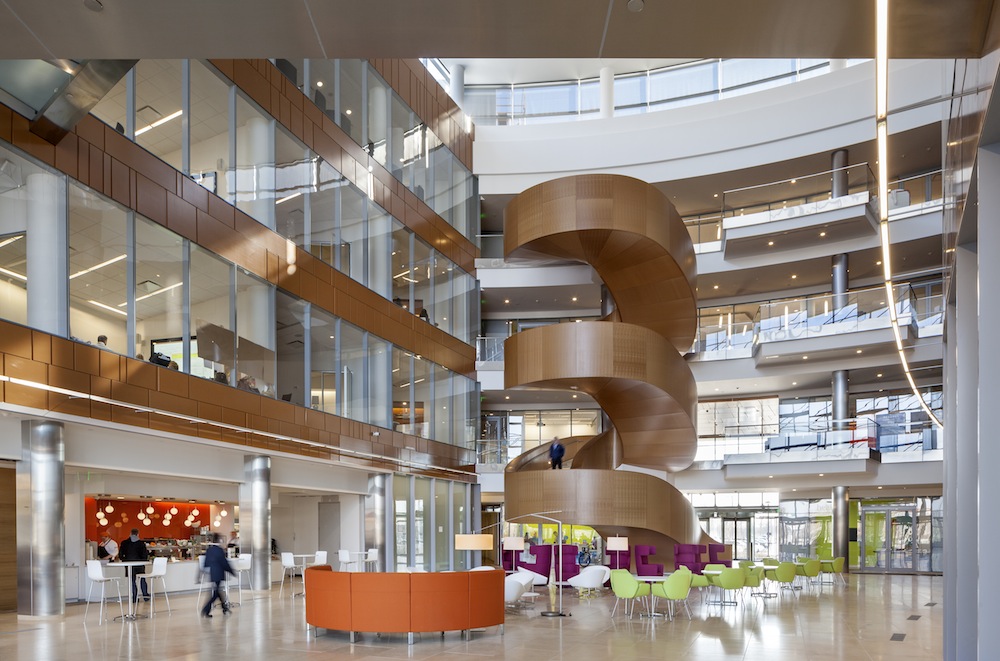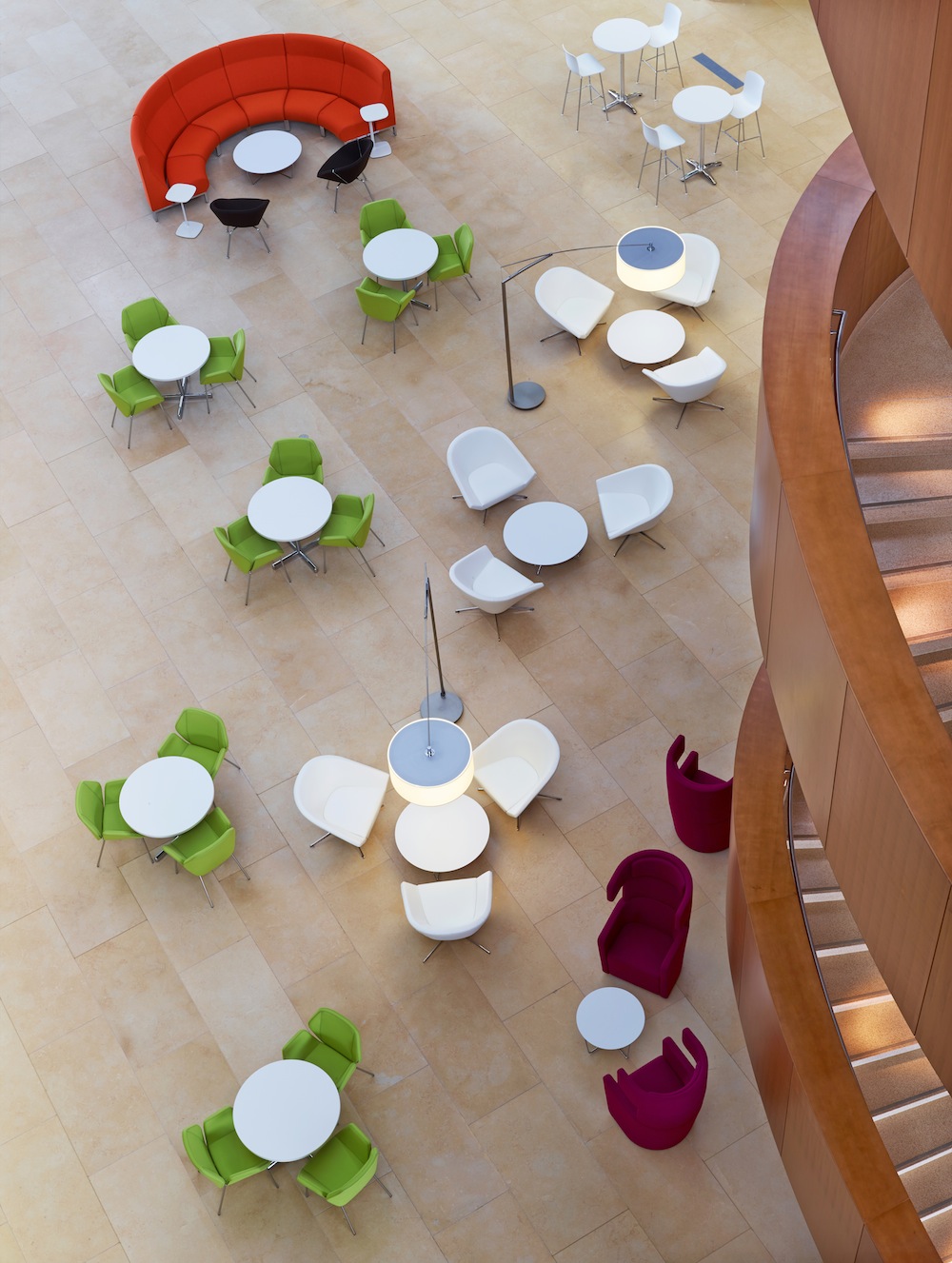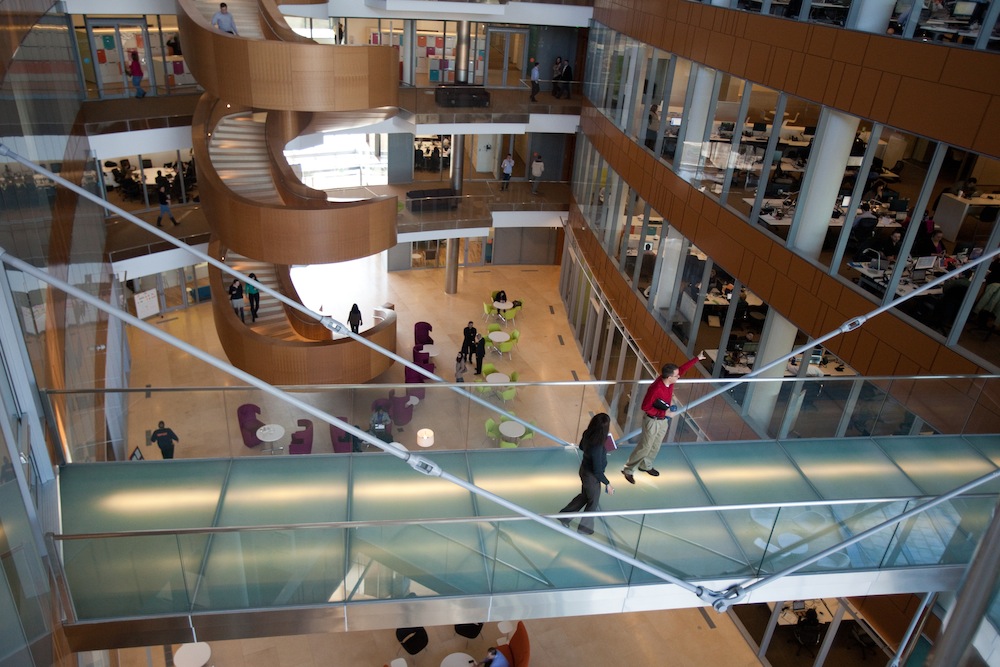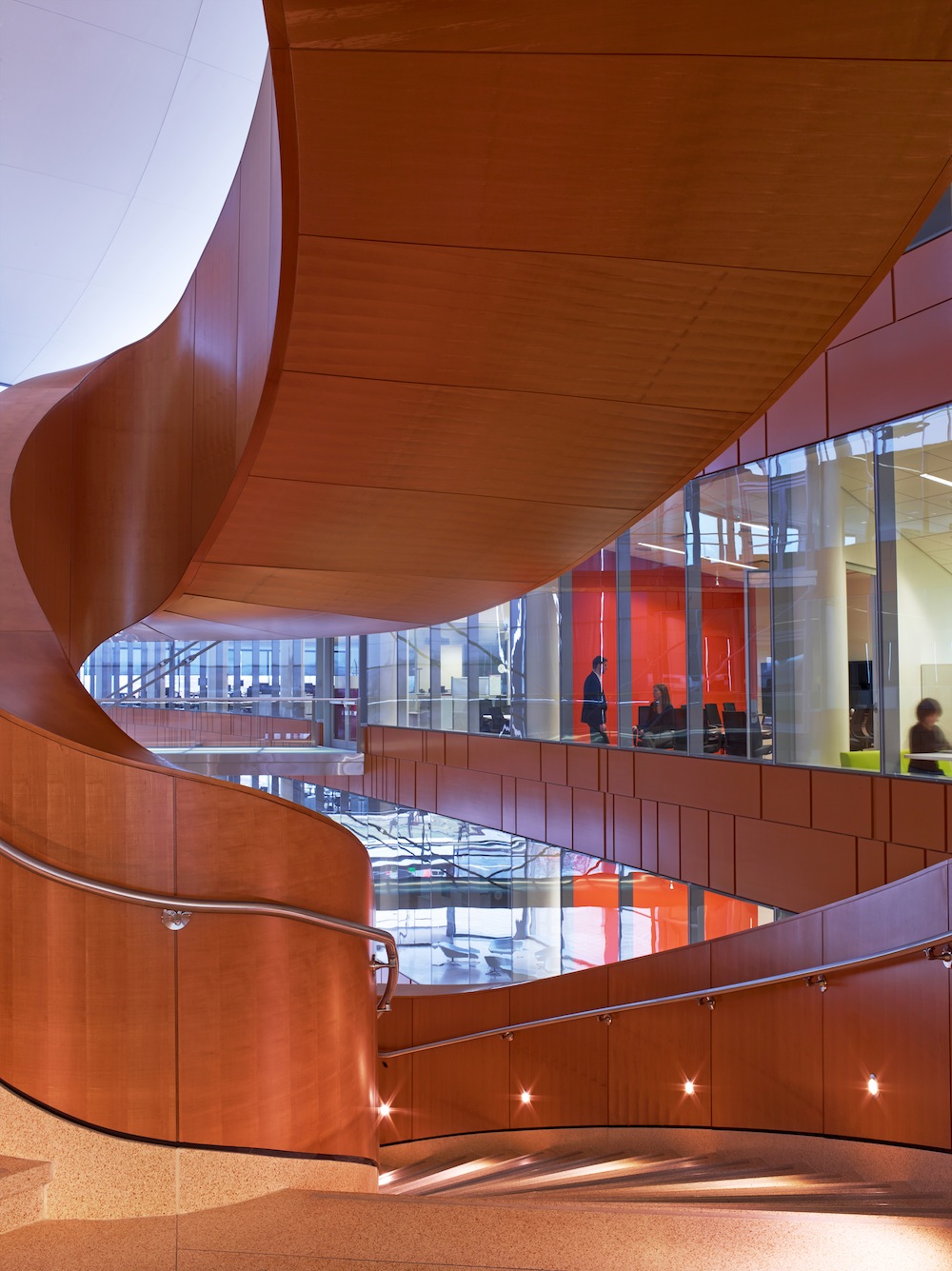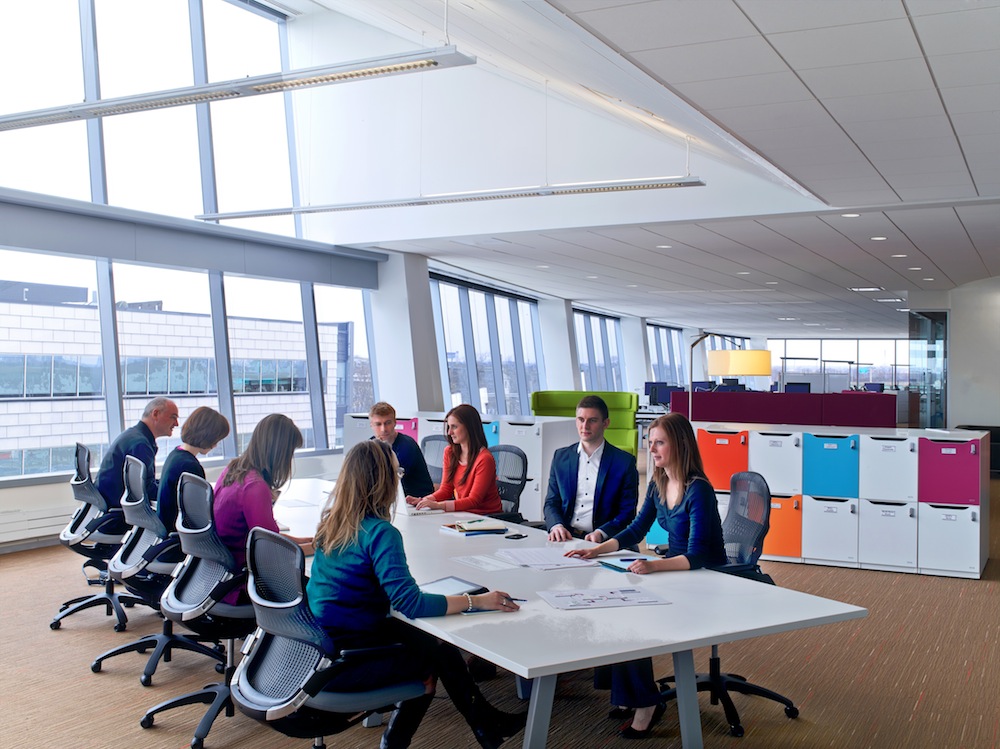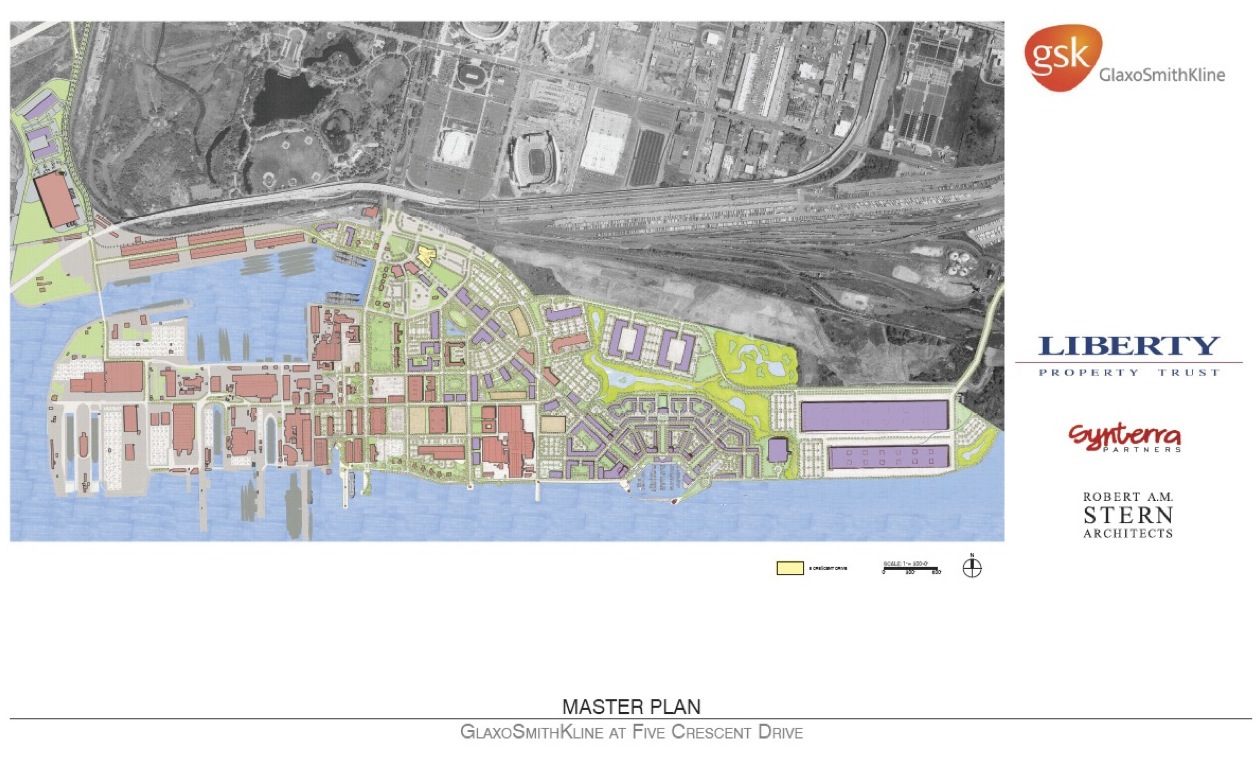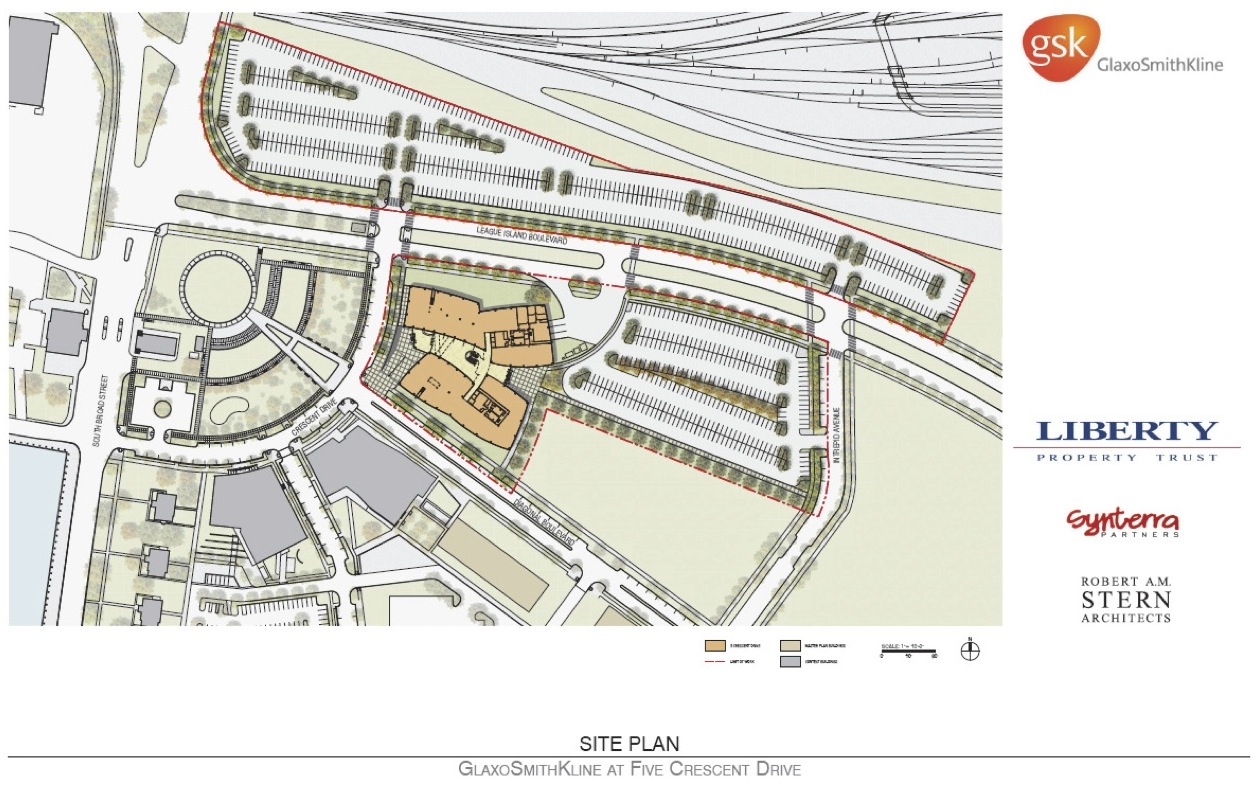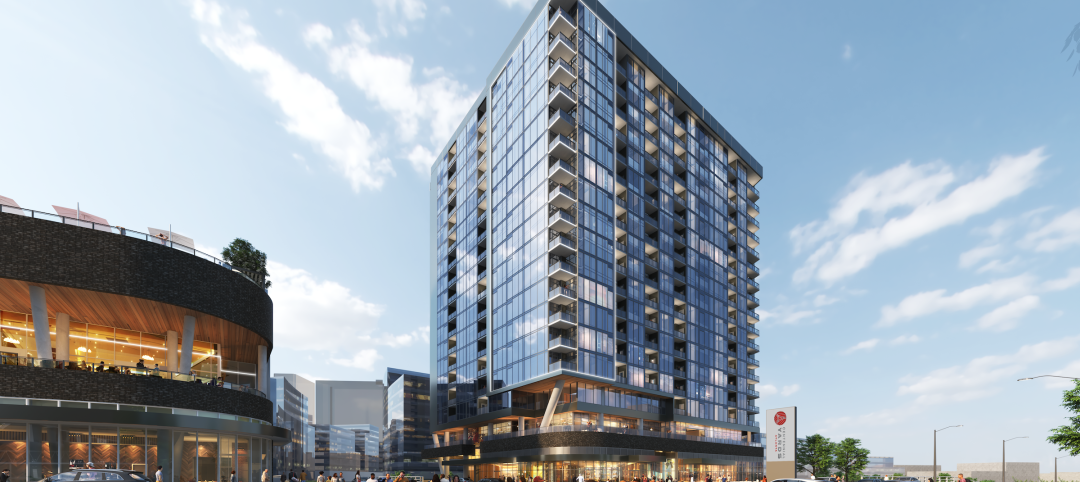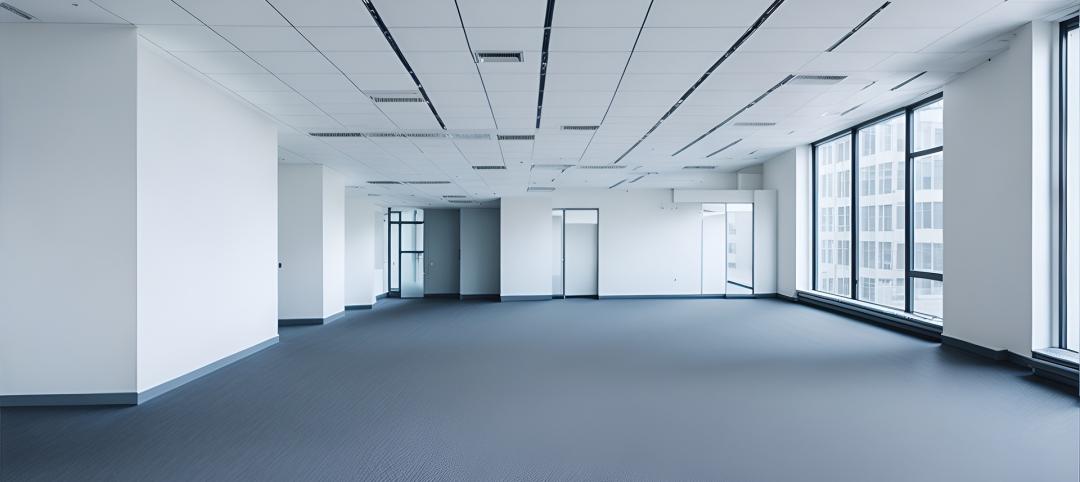GlaxoSmithKline officially opened its new double LEED Platinum certified facility in Philadelphia’s Navy Yard Corporate Center earlier today, ushering in a new era of how people work in Philadelphia. Employees, families and friends celebrated a ribbon-cutting ceremony with GSK President of North America Pharmaceuticals Deirdre Connelly, Liberty Property Trust Chief Executive Officer Bill Hankowsky, Synterra Partners Principal Bill Wilson, design architect Robert A.M. Stern, workplace strategist and interior architect Francis Cauffman Principal John Campbell and Philadelphia Mayor Michael A. Nutter.
“Our new work space is designed to inspire and connect people,” says Deirdre Connelly, President, North America Pharmaceuticals, GSK. “My teammates and I are energized by this new environment, where we can do our best work and collaborate without the constraints of office walls.”
The 208,000 square foot building at Five Crescent Drive represents an $80 million investment by Liberty Property/Synterra, and an investment of approximately $70 million by GSK. GSK has signed a 15.5-year lease at the building, which includes a four-story central atrium, a monumental stairway, a coffee shop, cafeteria, fitness center, meeting centers and a large multi-purpose room.
“GSK’s new facility reflects the reality of The Navy Yard: it is a Philadelphia magnet for creative, forward-looking companies,” said Bill Hankowsky, Chief Executive Officer, Liberty Property Trust. “Innovation and growth are now synonymous with this dynamic environment.”
Photo: Francis Dzikowski / Esto for Robert A.M. Stern Architects, LLP
The four-story, glass-encased building with an open floor plan and grand central staircase has been awarded both Core & Shell™ and Commercial Interiors™ LEED® Platinum certification from the U.S. Green Building Council. It is the first double LEED® Platinum building in Philadelphia. It is anticipated that the innovative building systems will save as much as 30% of energy use when compared to a traditional building.
These substantial energy savings are the result of the state-of-the-art building façade and high-performance glass which maximize daylight in winter while reducing heat gain and providing shading in summer. ENERGY STAR-rated lighting and equipment, as well as an astronomical time clock and cloud sensor program, activate the automatic shades on windows to control glare. In addition smart meters track and monitor the building’s energy and water use and provide ongoing accountability for utility consumption and performance.
Photo: Francis Dzikowski / Esto for Robert A.M. Stern Architects, LLP
“It was GSK’s commitment to Philadelphia that put The Navy Yard well over the 10,000 employee mark,” said Mayor Michael A. Nutter. “Just 18 months ago we stood here to break ground on this project, and I am thrilled to be here today to celebrate the grand opening of one of the most innovative, healthy, and green work spaces in the US.
Sweeping views of Philadelphia are accessible from nearly 90% of the workspaces. In the office-less layout, employees are located in “neighborhoods” and can work in a variety of settings throughout the day. These include custom-designed sit-to-stand workstations, team tables, meeting areas, social areas with soft seating, and quiet rooms.
“Francis Cauffman is very excited to see employees working and interacting throughout the entire building, and to hear the highly positive employee response to their new workplace,” said John B. Campbell, LEED AP, AIA, RIBA, Principal-in-Charge of Workplace Strategies at Francis Cauffman. “By creating an open and healthy workplace environment focused on providing the right physical and IT tools with a wide variety of work settings throughout the building, the new workplace has transformed the level of energy, engagement and connectivity across the organization.”
Photo: Eric Laignel for Francis Cauffman
Daily service to and from Center City via The Navy Yard Express Shuttle along with plentiful parking and key amenities, such as parks with Wi-Fi access and recreational activities and the soon-to-be-completed Courtyard by Marriott, a flagship property with an upscale bar and restaurant, attract employees to a unique and vibrant setting.
Innovation and sustainability from top to bottom
Whether one starts on the top of the building, which offers a green rooftop, or at the front door apron which features Five Standards (Dazzle), a Mural Arts Program commissioned piece of public art by Virgil Marti, GlaxoSmithKline at The Navy Yard delivers excitement and energy. The five 16’ x 7’ foot steel and mirror polished stainless steel sculptures resemble looking glasses; their design fitting seamlessly along the GSK facade, which appears as a large transparent ship docked at Five Crescent Drive.
The roof is covered 40% with vegetation and an herb garden provides many benefits including: reducing energy costs by providing natural insulation; absorbing storm water reducing the burden on the public storm water system; offering a beautiful space for events and meetings; and providing additional workspace for employees. High-efficiency, low-flow plumbing fixtures are expected to reduce water use by as much as 50% as compared to a traditional building, which will save an estimated 1.8 million gallons of water per year.?
The building’s ventilation system provides 30% more fresh air than required by code and monitored by carbon dioxide sensors installed at high-density spaces which increase the amount of fresh air in those spaces as carbon dioxide levels increase. The GSK facility and its grounds have been designated as a non-smoking site.?
For more about the building, visit http://us.gsk.com/html/media-news/navy-yard-press-kit.html.
Photo: Francis Dzikowski / Esto for Robert A.M. Stern Architects, LLP
Photo: Francis Dzikowski / Esto for Robert A.M. Stern Architects, LLP
Photo: Eric Laignel for Francis Cauffman
Photo: Eric Laignel for Francis Cauffman
Related Stories
Adaptive Reuse | Sep 12, 2024
White paper on office-to-residential conversions released by IAPMO
IAPMO has published a new white paper titled “Adaptive Reuse: Converting Offices to Multi-Residential Family,” a comprehensive analysis of addressing housing shortages through the conversion of office spaces into residential units.
Mixed-Use | Sep 10, 2024
Centennial Yards, a $5 billion mixed-use development in downtown Atlanta, tops out its first residential tower
Centennial Yards Company has topped out The Mitchell, the first residential tower of Centennial Yards, a $5 billion mixed-use development in downtown Atlanta. Construction of the apartment building is expected to be complete by the middle of next year, with first move-ins slated for summer 2025.
Healthcare Facilities | Sep 9, 2024
Exploring the cutting edge of neuroscience facility design
BWBR Communications Specialist Amanda Fisher shares the unique considerations and challenges of designing neuroscience facilities.
Office Buildings | Sep 6, 2024
Fact sheet outlines benefits, challenges of thermal energy storage for commercial buildings
A U.S. Dept. of Energy document discusses the benefits and challenges of thermal energy storage for commercial buildings. The document explains how the various types of thermal energy storage technologies work, where their installation is most beneficial, and some practical considerations around installations.
Office Buildings | Sep 5, 2024
Office space downsizing trend appears to be past peak
The office downsizing trend may be past its peak, according to a CBRE survey of 225 companies with offices in the U.S., Canada, and Latin America. Just 37% of companies plan to shrink their office space this year compared to 57% last year, the survey found.
University Buildings | Sep 4, 2024
UC San Diego’s new Multidisciplinary Life Sciences Building will support research and teaching in both health and biological sciences
The University of California San Diego has approved plans for a new Multidisciplinary Life Sciences Building, with construction starting this fall. The 200,000-sf, six-level facility will be the first building on the UC San Diego campus to bridge health science research with biological science research and teaching.
Codes and Standards | Sep 3, 2024
Atlanta aims to crack down on blighted properties with new tax
A new Atlanta law is intended to crack down on absentee landlords including commercial property owners and clean up neglected properties. The “Blight Tax” allows city officials to put levies on blighted property owners up to 25 times higher than current millage rates.
Resiliency | Sep 3, 2024
Phius introduces retrofit standard for more resilient buildings
Phius recently released, REVIVE 2024, a retrofit standard for more resilient buildings. The standard focuses on resilience against grid outages by ensuring structures remain habitable for at least a week during extreme weather events.
Construction Costs | Sep 2, 2024
Construction material decreases level out, but some increases are expected to continue for the balance Q3 2024
The Q3 2024 Quarterly Construction Insights Report from Gordian examines the numerous variables that influence material pricing, including geography, global events and commodity volatility. Gordian and subject matter experts examine fluctuations in costs, their likely causes, and offer predictions about where pricing is likely to go from here. Here is a sampling of the report’s contents.
Adaptive Reuse | Aug 29, 2024
More than 1.2 billion sf of office space have strong potential for residential conversion
More than 1.2 billion sf of U.S. office space—14.8% of the nation’s total—have strong potential for conversion to residential use, according to real estate software and services firm Yardi. Yardi’s new Conversion Feasibility Index scores office buildings on their suitability for multifamily conversion.


